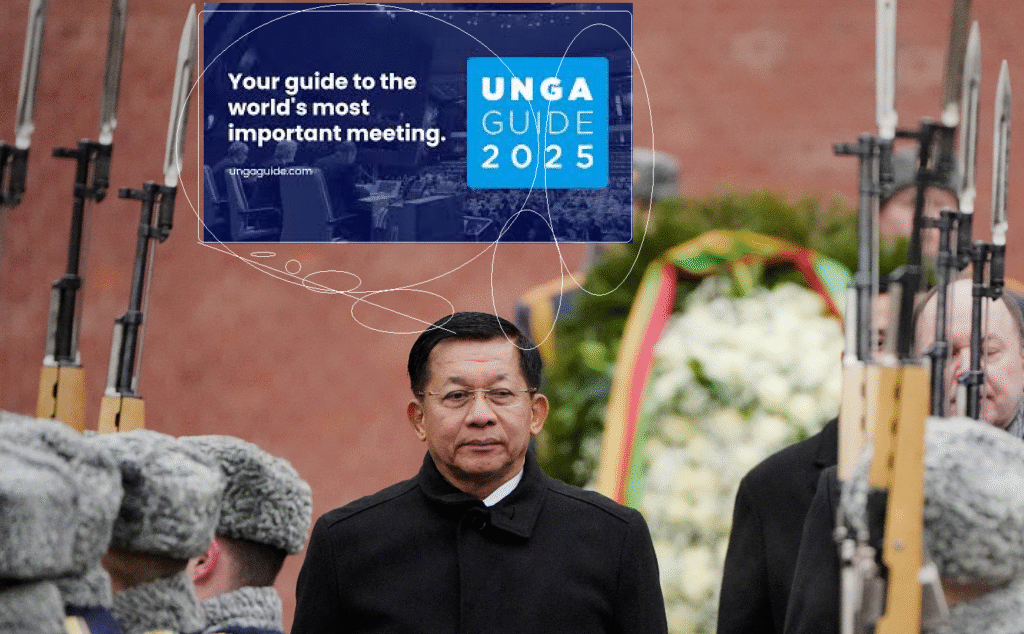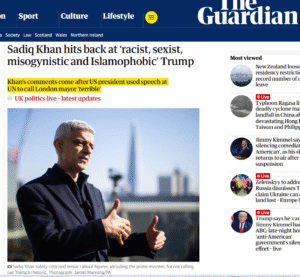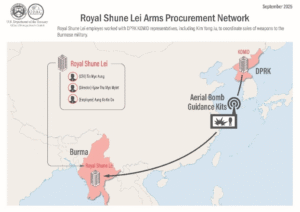Translated and edited from Ko Hla Soewai‘s post.
While world leaders gather at the United Nations in New York, Myanmar’s coup leader Min Aung Hlaing finds himself sidelined—attending a minor nuclear forum in Moscow instead.

By MMNN Desk
As the 78th UN General Assembly opens in New York with presidents and prime ministers from around the globe, Myanmar’s junta chief Min Aung Hlaing is nowhere to be seen. Instead, he has flown to Moscow to attend the World Atomic Week forum from September 26–28.
Junta-controlled media boast that the forum will feature international leaders. In reality, only a few of Russia’s closest allies—the presidents or prime ministers of Belarus, Armenia, and Iraq—are expected. Most other countries will be represented by ministers, company executives, scientists, or business delegates.
Myanmar, meanwhile, has no nuclear reactors, no research facilities, and no credible nuclear program. The 2023 “Memorandum of Understanding” with Russia on nuclear energy was largely symbolic and non-binding. Observers say the Moscow trip is more about optics—trying to project that Moscow stands firmly behind the junta.
Yet even Russian backing comes with limits. In Syria, despite Moscow’s direct military support, Bashar al-Assad was forced to cede ground. Few now view Russian protection as a guarantee.
UN and ASEAN: Parallel Tracks
In stark contrast, New York is hosting critical discussions on global crises, including Myanmar. On September 30, Bangladeshi Prime Minister Muhammad Yunus is set to convene a special session on the Rohingya issue—an urgent matter absent from Min Aung Hlaing’s Moscow agenda.
ASEAN leaders also remain entangled with the junta. According to the South China Morning Post, the generals are blocking ASEAN involvement in their promised elections, fearing regional scrutiny. Four ASEAN foreign ministers even postponed a visit to Myanmar. Analysts suggest Min Aung Hlaing believes support from China and India is sufficient, making ASEAN’s role irrelevant in his eyes.
ASEAN has, however, reiterated that peace—not elections—must take precedence. The bloc has committed to engaging with all Myanmar stakeholders, not just the generals, and is considering sending monitoring groups, including potential ceasefire observers. But ASEAN’s founding principle of “non-interference” continues to limit concrete action.
A Hollow Election, A Brutal Regime
For ordinary citizens, the junta’s promised election is seen as nothing more than camouflage—an attempt to dress military dictatorship in democratic clothing. The generals’ crimes against civilians remain indelible and unforgivable.
Min Aung Hlaing and his allies lack both the qualities of statesmen and the competence of administrators. Instead, they cling to power by staging hollow spectacles, propped up by China and Russia while crushing dissent at home.
The international community is not blind. Global courts are gathering evidence for genocide and crimes against humanity. Bangladesh’s Prime Minister has already urged the world to reconsider ties with Myanmar’s junta, denouncing its atrocities in plain terms.
The People’s Verdict
Myanmar’s people understand the truth: the generals’ rule is a bloodstained play, staged at terrible cost. Despite repression, the just struggle of the people continues—and will, in time, prevail.





